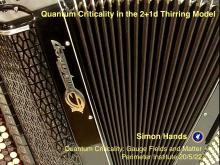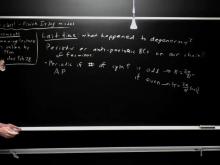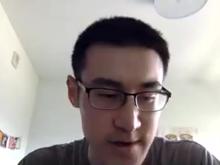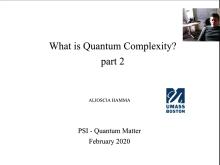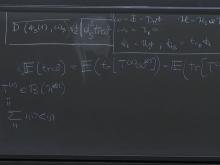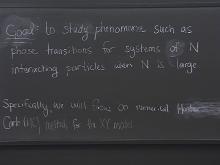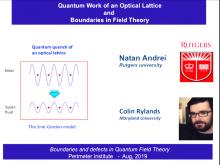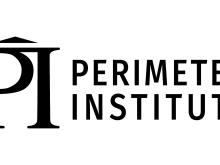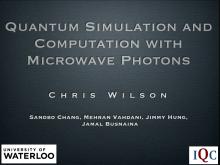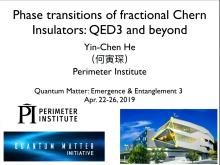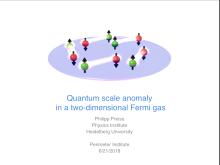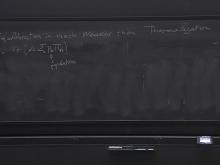Condensed matter physics is the branch of physics that studies systems of very large numbers of particles in a condensed state, like solids or liquids. Condensed matter physics wants to answer questions like: why is a material magnetic? Or why is it insulating or conducting? Or new, exciting questions like: what materials are good to make a reliable quantum computer? Can we describe gravity as the behavior of a material? The behavior of a system with many particles is very different from that of its individual particles. We say that the laws of many body physics are emergent or collective. Emergence explains the beauty of physics laws.
Format results
-
27 talks-Collection NumberC22009
Talk
-

Welcome and Opening Remarks
-
Roger Melko University of Waterloo
-
Shailesh Chandrasekharan Duke University
-
Ribhu Kaul University of Kentucky
-
-

Blackboard Talk 1 - Virtual
Senthil Todadri Massachusetts Institute of Technology (MIT) - Department of Physics
-

Blackboard Talk 2
Senthil Todadri Massachusetts Institute of Technology (MIT) - Department of Physics
-

-

Reducing the Sign Problem with Complex Neural Networks
Johann Ostmeyer University of Liverpool
-

Self dual U(1) lattice field theory with a theta-term
Christoff Gatringer FWF Austrian Science Fund
-

Quantum electrodynamics with massless fermions in three dimensions - Talk 1
Rajamani Narayanan Florida International University
-

Quantum electrodynamics with massless fermions in three dimensions - Talk 2
Rajamani Narayanan Florida International University
-
-
PSI Lecture - Condensed Matter
15 talksCollection NumberC22002Talk
-

PSI Lecture - Condensed Matter - Lecture 1
Aaron Szasz Alphabet (United States)
-

PSI Lecture - Condensed Matter - Lecture 2
Aaron Szasz Alphabet (United States)
-

PSI Lecture - Condensed Matter - Lecture 3
Aaron Szasz Alphabet (United States)
-

PSI Lecture - Condensed Matter - Lecture 4
Aaron Szasz Alphabet (United States)
-

PSI Lecture - Condensed Matter - Lecture 5
Aaron Szasz Alphabet (United States)
-

PSI Lecture - Condensed Matter - Lecture 6
Aaron Szasz Alphabet (United States)
-

PSI Lecture - Condensed Matter - Lecture 7
Aaron Szasz Alphabet (United States)
-

PSI Lecture - Condensed Matter - Lecture 8
Aaron Szasz Alphabet (United States)
-
-
Online School on Ultra Quantum Matter
20 talks-Collection NumberC20032Talk
-

Welcome and Opening Remarks
Michael Hermele University of Colorado Boulder
-

Quantum Phases of Matter and Entanglement Basics
John McGreevy University of California, San Diego
-

Seminar: Engineering quantum spin models with atoms and light
Monika Schleier-Smith Stanford University
-

SYK criticality and correlated metals
Subir Sachdev Harvard University
-

-

-

Seminar: Quantum matter in Moire materials
Pablo Jarillo-Herrero Massachusetts Institute of Technology (MIT) - Center for Extreme Quantum Information Theory (xQIT)
-

Exactly Solvable Topological and Fracton Models as Gauge Theories 1
Xie Chen California Institute of Technology
-
-
PSI 2019/2020 - Quantum Matter (Part 2)
2 talks-Collection NumberC20010Talk
-

PSI 2019/2020 - Quantum Matter Part 2 - Lecture 1
Alioscia Hamma University of Naples Federico II
-

PSI 2019/2020 - Quantum Matter Part 2 - Lecture 2
Alioscia Hamma University of Naples Federico II
-
-
PSI 2019/2020 - Quantum Matter Part 1
18 talks-Collection NumberC20003Talk
-

PSI 2019/2020 - Quantum Matter Part 1 - Lecture 1
Alioscia Hamma University of Naples Federico II
-

PSI 2019/2020 - Quantum Matter Part 1 - Lecture 2
Alioscia Hamma University of Naples Federico II
-

PSI 2019/2020 - Quantum Matter Part 1 - Lecture 3
Alioscia Hamma University of Naples Federico II
-

PSI 2019/2020 - Quantum Matter Part 1 - Lecture 4
Alioscia Hamma University of Naples Federico II
-

PSI 2019/2020 - Quantum Matter Part 1 - Lecture 5
Alioscia Hamma University of Naples Federico II
-

PSI 2019/2020 - Quantum Matter Part 1 - Lecture 6
Alioscia Hamma University of Naples Federico II
-

PSI 2019/2020 - Quantum Matter Part 1 - Lecture 7
Alioscia Hamma University of Naples Federico II
-

PSI 2019/2020 - Quantum Matter Part 1 - Lecture 8
Alioscia Hamma University of Naples Federico II
-
-
PSI 2019/2020 - Condensed Matter (Wang)
16 talks-Collection NumberC19043Talk
-

PSI 2019/2020 - Condensed Matter (Wang) - Lecture 1
Chong Wang Perimeter Institute for Theoretical Physics
-

PSI 2019/2020 - Condensed Matter (Wang) - Lecture 2
Chong Wang Perimeter Institute for Theoretical Physics
-

PSI 2019/2020 - Condensed Matter (Wang) - Lecture 3
Chong Wang Perimeter Institute for Theoretical Physics
-

PSI 2019/2020 - Condensed Matter (Wang) - Lecture 4
Chong Wang Perimeter Institute for Theoretical Physics
-

PSI 2019/2020 - Condensed Matter (Wang) - Lecture 5
Chong Wang Perimeter Institute for Theoretical Physics
-

PSI 2019/2020 - Condensed Matter (Wang) - Lecture 6
Chong Wang Perimeter Institute for Theoretical Physics
-

PSI 2019/2020 - Condensed Matter (Wang) - Lecture 7
Chong Wang Perimeter Institute for Theoretical Physics
-

PSI 2019/2020 - Condensed Matter (Wang) - Lecture 8
Chong Wang Perimeter Institute for Theoretical Physics
-
-
Boundaries and Defects in Quantum Field Theory
21 talks-Collection NumberC19035Talk
-

Symmetries and Dualities of Abelian TQFTs
Jaume Gomis Perimeter Institute for Theoretical Physics
-

TBD
Leonardo Rastelli Stony Brook University
-

Universality at large transverse spin in defect CFTs
Madalena Lemos European Organization for Nuclear Research (CERN)
-

Domain Walls in Super-QCD
Francesco Benini SISSA International School for Advanced Studies
-

Weyl Anomaly Induced Current and Holography
Rong-Xin Miao Sun Yat-sen University
-

Wilson line impurities, flows and entanglement entropy
Prem Kumar Swansea University
-

Anomalies in the Space of Coupling Constants
Nathan Seiberg Institute for Advanced Study (IAS)
-

-
-
Machine Learning for Quantum Design
30 talks-Collection NumberC19025Talk
-

-

Simulating Thermal and Quantum Fluctuations in Materials and Molecules
Michele Ceriotti L'Ecole Polytechnique Federale de Lausanne (EPFL)
-

How to use a Gaussian Boson Sampler to learn from graph-structured data
Maria Schuld University of KwaZulu-Natal
-

Machine learning meets quantum physics
Dong-Ling Deng Tsinghua University
-

-

Engineering Programmable Spin Interactions in a Near-Concentric Cavity
Emily Davis Stanford University
-

Alleviating the sign structure of quantum states
Giacomo Torlai Flatiron Institute
-

Navigating the quantum computing field as a high school student
Tanisha Bassan The Knowledge Society
-
-
Many-Body States and Dynamics Workshop II
8 talks-Collection NumberC19024Talk
-

Simulating an expanding universe on Google's Bristlecone
Guifre Vidal Alphabet (United States)
-

Preparing Critical and Thermofield Double States on a Quantum Computer
Timothy Hsieh Perimeter Institute for Theoretical Physics
-

TensorNetwork: accelerating tensor network computations and improving the coding experience
Ashley Milsted California Institute of Technology
-

Maximally sensitive sets of states
Daniel Gottesman University of Maryland, College Park
-

Quantum simulation of 2D and 3D spin models in a linear chain of ions
Kazi-Rajibul Islam Institute for Quantum Computing (IQC)
-

Polariton Graph Network
Na Young Kim Institute for Quantum Computing (IQC)
-

-

Quantum Simulation of Lattice Field Theories with Microwave Photons
Christopher Wilson Institute for Quantum Computing (IQC)
-
-
Quantum Matter: Emergence & Entanglement 3
24 talks-Collection NumberC19021Talk
-

Theory of a Planckian metal with a remnant Fermi surface.
Subir Sachdev Harvard University
-

Twisted foliated fracton order
Xie Chen California Institute of Technology
-

Landau ordering and other phase transitions beyond the Landau paradigm
Senthil Todadri Massachusetts Institute of Technology (MIT) - Department of Physics
-

QED and quantum magnetism in (2+1)d
Chong Wang Perimeter Institute for Theoretical Physics
-

-

Shadow of complex fixed point: Approxmiate conformality of Q>4 Potts model
Han Ma Stony Brook University
-

On the relation between the magnitude and exponent of OTOCs
Yingfei Gu Harvard University
-

Firewalls vs. Scrambling
Beni Yoshida Perimeter Institute for Theoretical Physics
-
-
Low Energy Challenges for High Energy Physicists 3
16 talks-Collection NumberC18013Talk
-

Emergent Gravity From Relatively Local Hamiltonians
Sung-Sik Lee McMaster University
-

Strange Metals From Local Quantum Chaos
John McGreevy University of California, San Diego
PIRSA:18060028 -

-

-

Holographic Solids: Transverse Phonons and Elastic Response
Lasma Alberte International School for Advanced Studies
PIRSA:18060031 -

Particle Physics Beyond Colliders
Asimina Arvanitaki Perimeter Institute for Theoretical Physics
PIRSA:18060032 -

-

-
-
PSI 2017/2018 - Condensed Matter (Hamma)
15 talks-Collection NumberC17044Talk
-

PSI 2017/2018 - Condensed Matter - Lecture 1
Alioscia Hamma University of Naples Federico II
-

PSI 2017/2018 - Condensed Matter - Lecture 2
Alioscia Hamma University of Naples Federico II
-

PSI 2017/2018 - Condensed Matter - Lecture 3
Alioscia Hamma University of Naples Federico II
-

PSI 2017/2018 - Condensed Matter - Lecture 4
Alioscia Hamma University of Naples Federico II
-

PSI 2017/2018 - Condensed Matter - Lecture 5
Alioscia Hamma University of Naples Federico II
-

PSI 2017/2018 - Condensed Matter - Lecture 6
Alioscia Hamma University of Naples Federico II
PIRSA:18010081 -

PSI 2017/2018 - Condensed Matter - Lecture 7
Alioscia Hamma University of Naples Federico II
-

PSI 2017/2018 - Condensed Matter - Lecture 8
Alioscia Hamma University of Naples Federico II
-
-
Quantum Criticality: Gauge Fields and Matter
27 talks-Collection NumberC22009Quantum Criticality: Gauge Fields and Matter -
-
Online School on Ultra Quantum Matter
20 talks-Collection NumberC20032 -
PSI 2019/2020 - Quantum Matter (Part 2)
2 talks-Collection NumberC20010PSI 2019/2020 - Quantum Matter (Part 2) -
PSI 2019/2020 - Quantum Matter Part 1
18 talks-Collection NumberC20003PSI 2019/2020 - Quantum Matter Part 1 -
PSI 2019/2020 - Condensed Matter (Wang)
16 talks-Collection NumberC19043PSI 2019/2020 - Condensed Matter (Wang) -
Boundaries and Defects in Quantum Field Theory
21 talks-Collection NumberC19035Boundaries and defects play central roles in quantum field theory (QFT) both as means to make contact with nature and as tools to constrain and understand QFT itself. Boundaries in QFT can be used to model impurities and also the finite extent of sample sizes while interfaces allow for different phases of matter to interact in a controllable way. More formally these structures shed light on the structure of QFT by providing new examples of dualities and renormalization group flows. Broadly speaking this meeting will focus on three areas: 1) formal and applied aspects of boundary and defect conformal field theory from anomalies and c-theorems to topological insulators 2) supersymmetry and duality from exact computations of new observables to the construction of new theories and 3) QFT in curved space and gravity from holographic computations of entanglement entropy to ideas in quantum information theory. Registration for this event is now open.
-
Machine Learning for Quantum Design
30 talks-Collection NumberC19025Machine learning techniques are rapidly being adopted into the field of quantum many-body physics including condensed matter theory experiment and quantum information science. The steady increase in data being produced by highly-controlled quantum experiments brings the potential of machine learning algorithms to the forefront of scientific advancement. Particularly exciting is the prospect of using machine learning for the discovery and design of quantum materials devices and computers. In order to make progress the field must address a number of fundamental questions related to the challenges of studying many-body quantum mechanics using classical computing algorithms and hardware. The goal of this conference is to bring together experts in computational physics machine learning and quantum information to make headway on a number of related topics including: Data-drive quantum state reconstruction Machine learning strategies for quantum error correction Neural-network based wavefunctions Near-term prospects for data from quantum devices Machine learning for quantum algorithm discovery Registration for this event is now closed
-
Many-Body States and Dynamics Workshop II
8 talks-Collection NumberC19024On Thursday June 13 the Institute for Quantum Computing (IQC) and Perimeter Institute for Theoretical Physics (PI) will participate in the one-day Many-Body States and Dynamics Workshop II. The goal of the workshop is to describe ongoing efforts to experimentally realize quantum many-body states and dynamics and discuss interesting classes of states and dynamics that could be targeted. Experimentalists working on several platforms (such as photons atom and ion traps superconducting qubits exciton-polaritons or NMR) and theoreticians specialized in many-body theory (entanglement topological order gauge theories criticality chaos error correction holography) and numerical simulations (exact diagonalization Monte Carlo DMRG tensor networks) will meet for a morning workshop to identify and discuss common interests.
-
Quantum Matter: Emergence & Entanglement 3
24 talks-Collection NumberC19021This third workshop of the Perimeter Institute series Emergence and Entanglement will center around four major frontiers in quantum matter research: (i) topological matter including recently discovered phases in three dimensions and new routes toward experimental realization (ii) critical states of matter especially interacting CFTs in 2+1 dimensions and dualities (iii) state-of-the-art numerical approaches to tackle such many-body problems (e.g. DMRG MERA Monte Carlo) and (iv) quantum dynamics and thermalization.
-
Low Energy Challenges for High Energy Physicists 3
16 talks-Collection NumberC18013Throughout the history of quantum field theory there has been a rich cross-pollination between high energy and condensed matter physics. From the theory of renormalization to the consequences of spontaneous symmetry breaking this interaction has been an incredibly fruitful one. In the last decade there has been a strong resurgence of interest in condensed matter systems in the high energy theoretical physics community. Taking advantage of developments in conformal field theories the conformal bootstrap gauge/gravity and other type of dualities as well as effective field theory techniques high energy theorists with all kinds of specialist backgrounds are thinking about the diverse behavior exhibited in low energy physical systems. Recent developments also employed quantum field theory ideas to improve our understanding of condensed and quantum matter systems as for example Femi liquids strange metals or the behavior of topological defects in ultra cold atom gases. For certain questions such approaches present relevant advantages with respect to more traditional techniques. Moreover in recent years the interplay between high energy and condensed matter physics found new fuel in the search for light dark matter. Indeed theoretical analyses have recently shifted the attention towards model for sub-GeV dark matter. The condensed matter community has played a crucial role in the design of possible new materials and detectors that could allow the observation of such particles. The aim of this workshop is to bring together like-minded high energy theorists with appropriate condensed matter theorists and experimentalists to tackle some of the most interesting problems in modern physics. The format has been designed to allow for plenty of time for open discussion and interaction between the participants. This will reinvigorate existing collaborations as well as create new fruitful ones.
-
PSI 2017/2018 - Condensed Matter (Hamma)
15 talks-Collection NumberC17044PSI 2017/2018 - Condensed Matter (Hamma)
